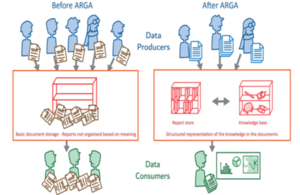Intelligent support to human authors for faster and better exploitation of unstructured text
ARGA uses machine learning and natural language through the novel approach of working alongside authors to add structure in real time

Graphics showing a scene of characters and two book shelves demonstrating documents that are not organised (before ARGA) and how documents can have structure and be organised successfully (After ARGA)
Challenge
The Ministry of Defence (MOD) generates vast amounts of text on a daily basis, covering everything from operational activity to accommodation and catering. This text, which is largely unstructured, must be searched for, read and analysed in order to support decision-making. This is very resource intensive for Defence.
Dr Lucy Mason, Head of DASA said:
The key challenge for data science over the next decade is to develop the next generation tools for information analysis, intelligence creation and visualisation to keep pace with the explosion in the volume of data available.
Solution
ARGA - a software tool which has received Phase 2 funding under the Defence and Security Accelerator (DASA) themed competition to ‘Revolutionise the human information relationship for Defence’ - addresses this challenge through the novel approach of working alongside authors to add structure in real time as they write.
As the first application of its kind, ARGA uses machine learning and natural language processing to support authors as they write text. It offers suggestions about the most salient information about the objects (e.g. people or places), relationships and events that can be accepted or rejected by the author. This creates structured data which can be automatically extracted and analysed, without the need for decision-makers to read through a whole body of text.
Using sensitive human-machine teaming, the tool empowers the author of documents to capture structure in the text they are writing at the point of creation, rather than attempting to process content weeks or months afterwards. As the author interacts with ARGA it learns more about the objects of interest, and its suggestions continually improve.
By using ARGA across a team or organisation, it can aggregate data across thousands of documents and represent this data visually to support decision-making and analysis (e.g. by presenting timelines of events or network diagrams representing key relationships). It allows organisations to make better use of information that’s locked away as text in documents, emails and reports for a much lower human resource cost.
Peter Coghill, Project Lead said:
DASA funding has helped us to create a tool that I desperately wanted when I worked as a government analyst. The resulting project has allowed us to develop a loose, abstract concept into a proven and customer-focused tool which could extend operational advantage and benefit many organisations.
Benefits
ARGA’s capacity to help organise and exploit written information has the potential to save significant time and money for large, complex organisations, such as those within the defence and healthcare sectors. However, the potential market for ARGA spans any settings where high volumes of written communication are produced and where rapid, low cost but - importantly - accurate processing provides competitive advantage.
Next Step
The project team is keen to explore commercial exploitation routes in a range of sectors, and is potentially interested in partnerships which open up other routes to market.